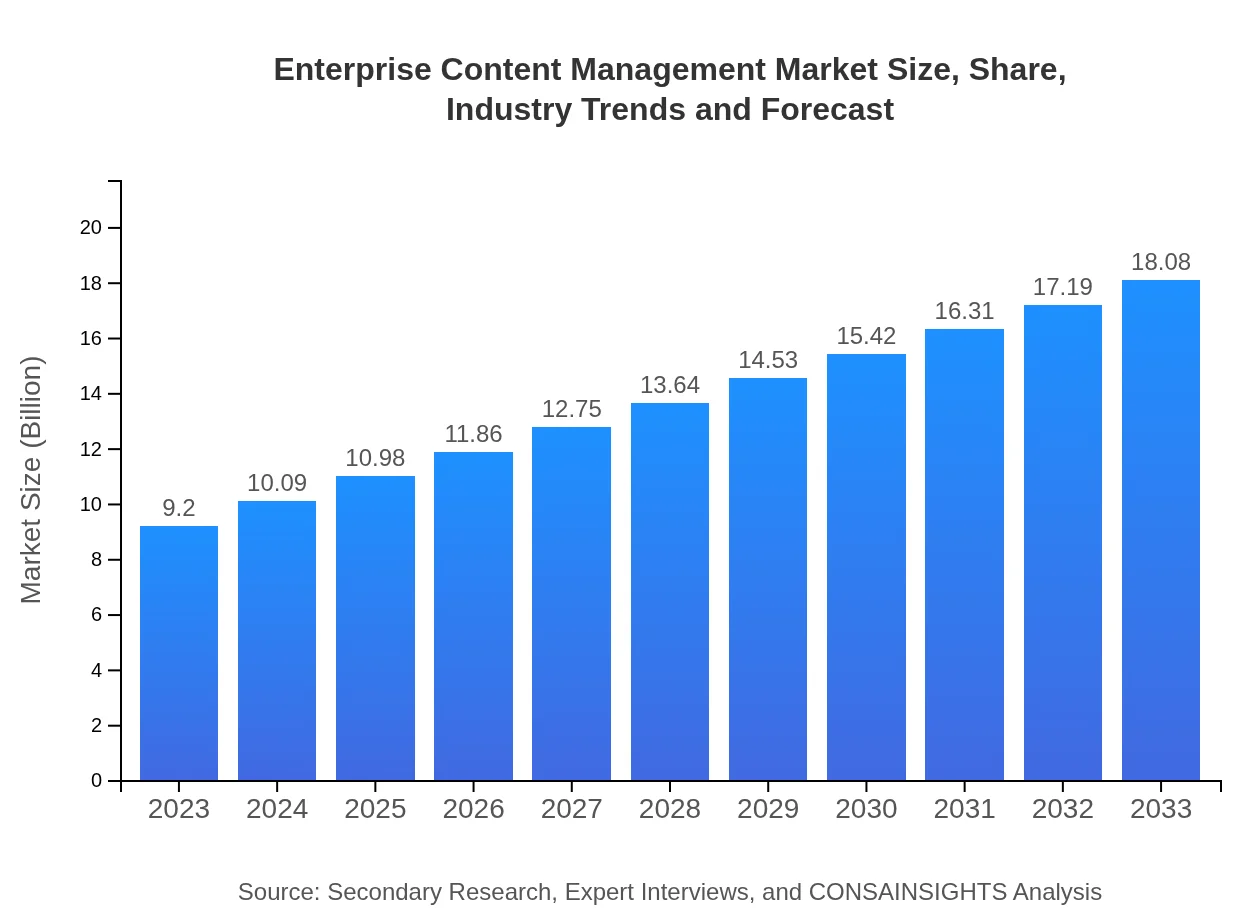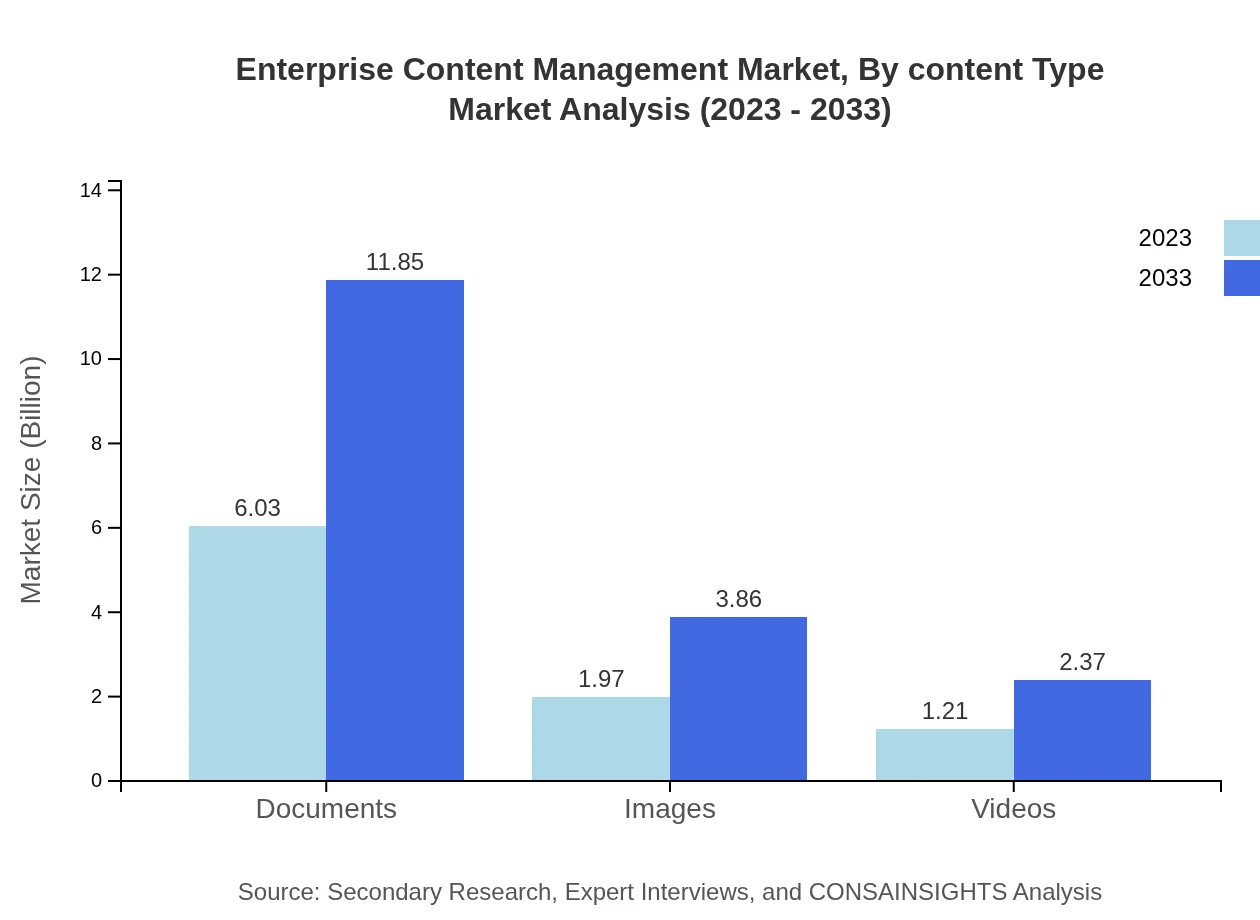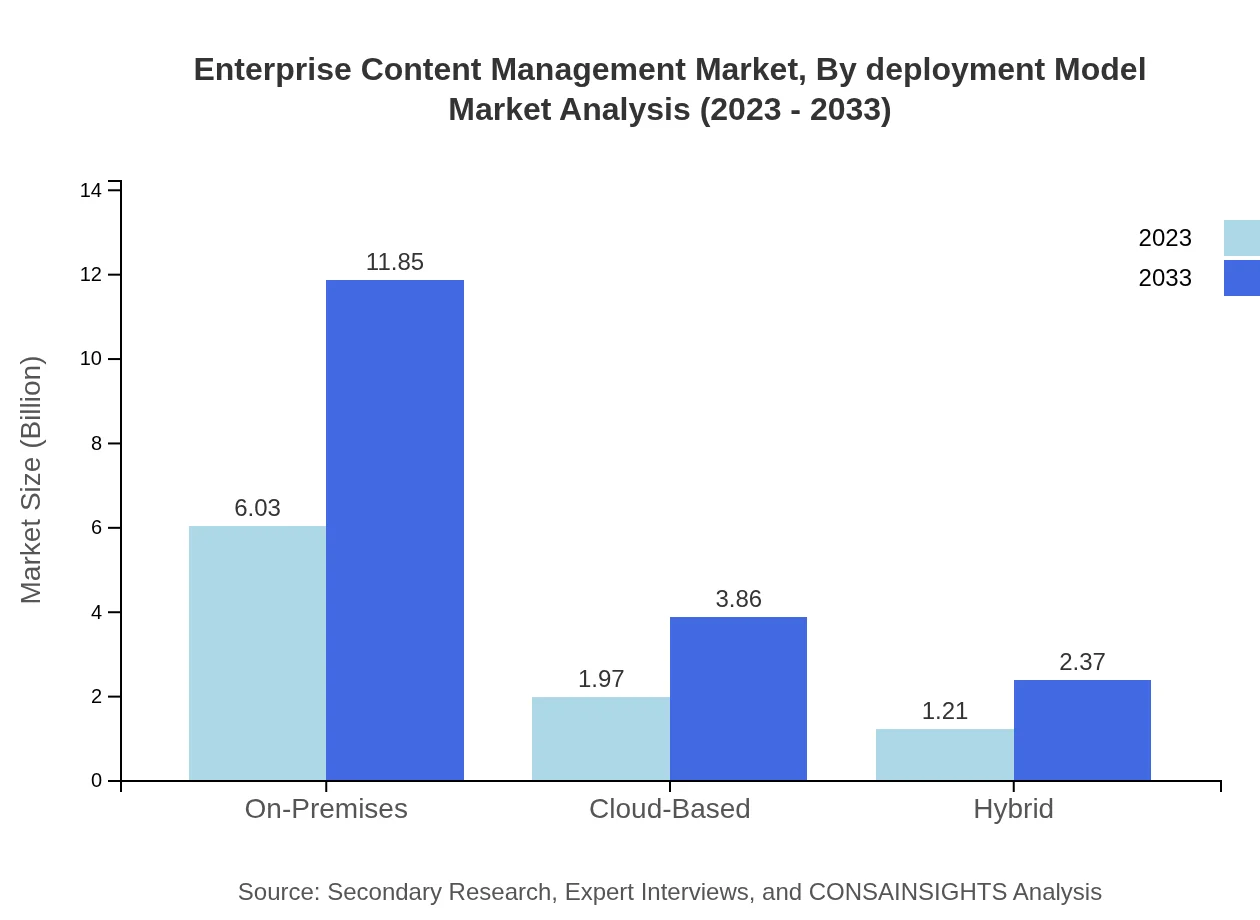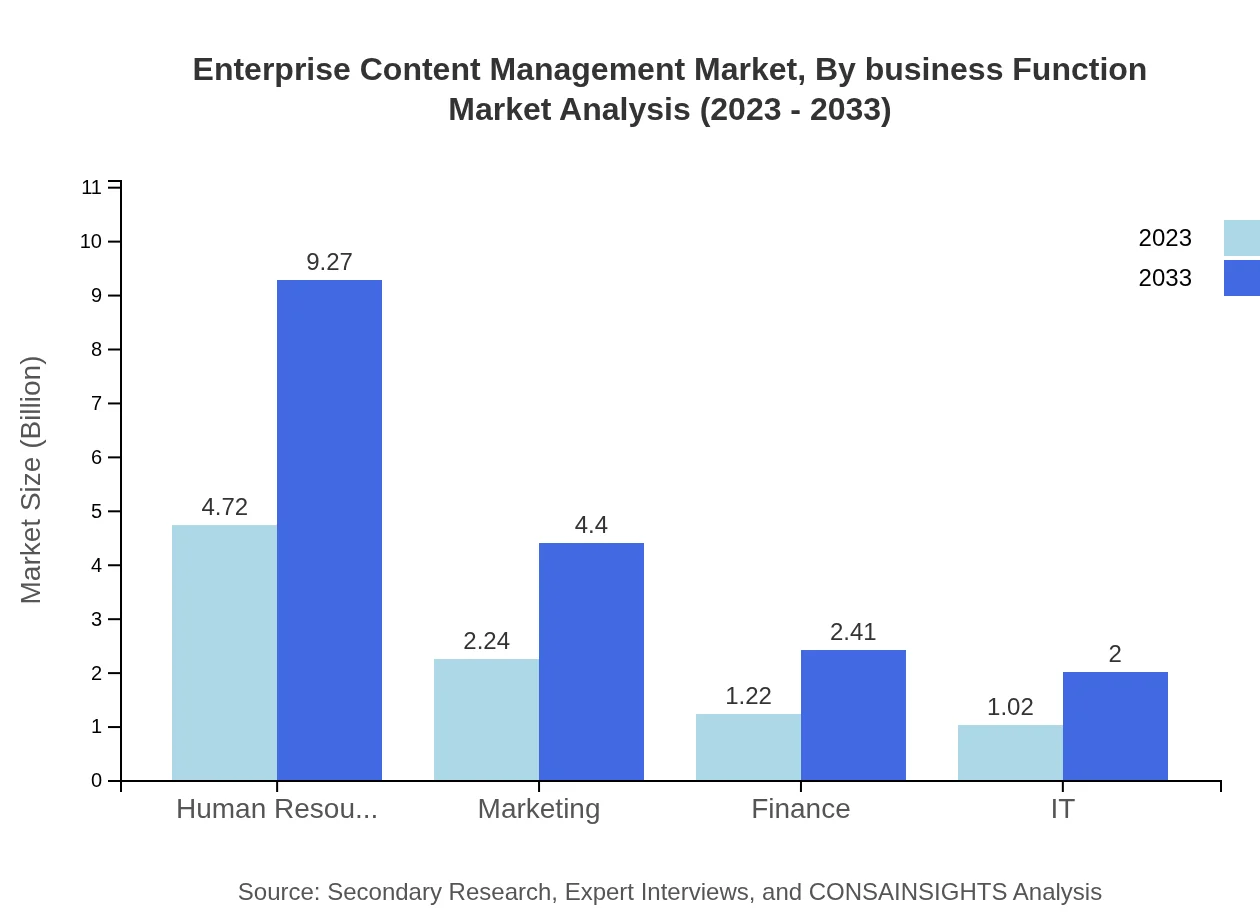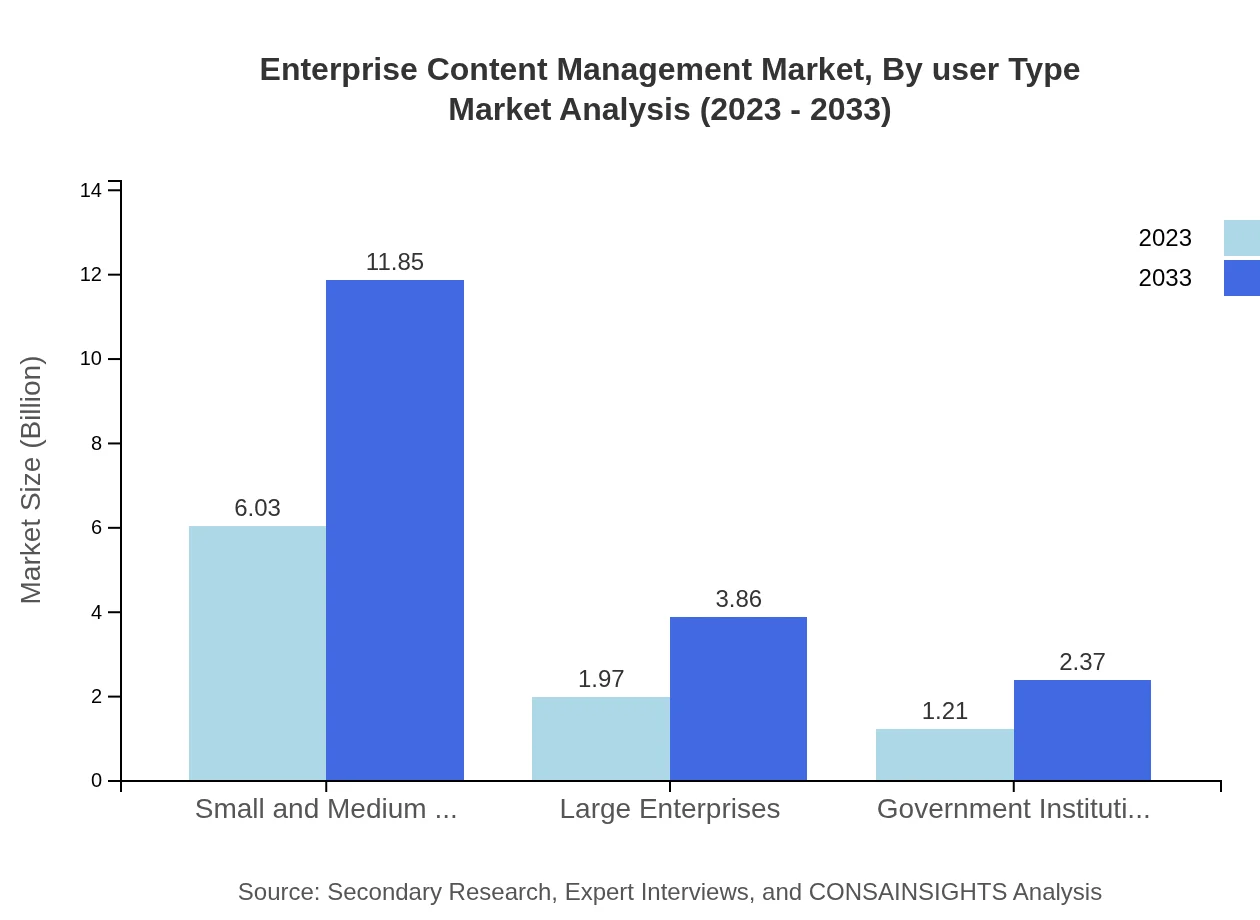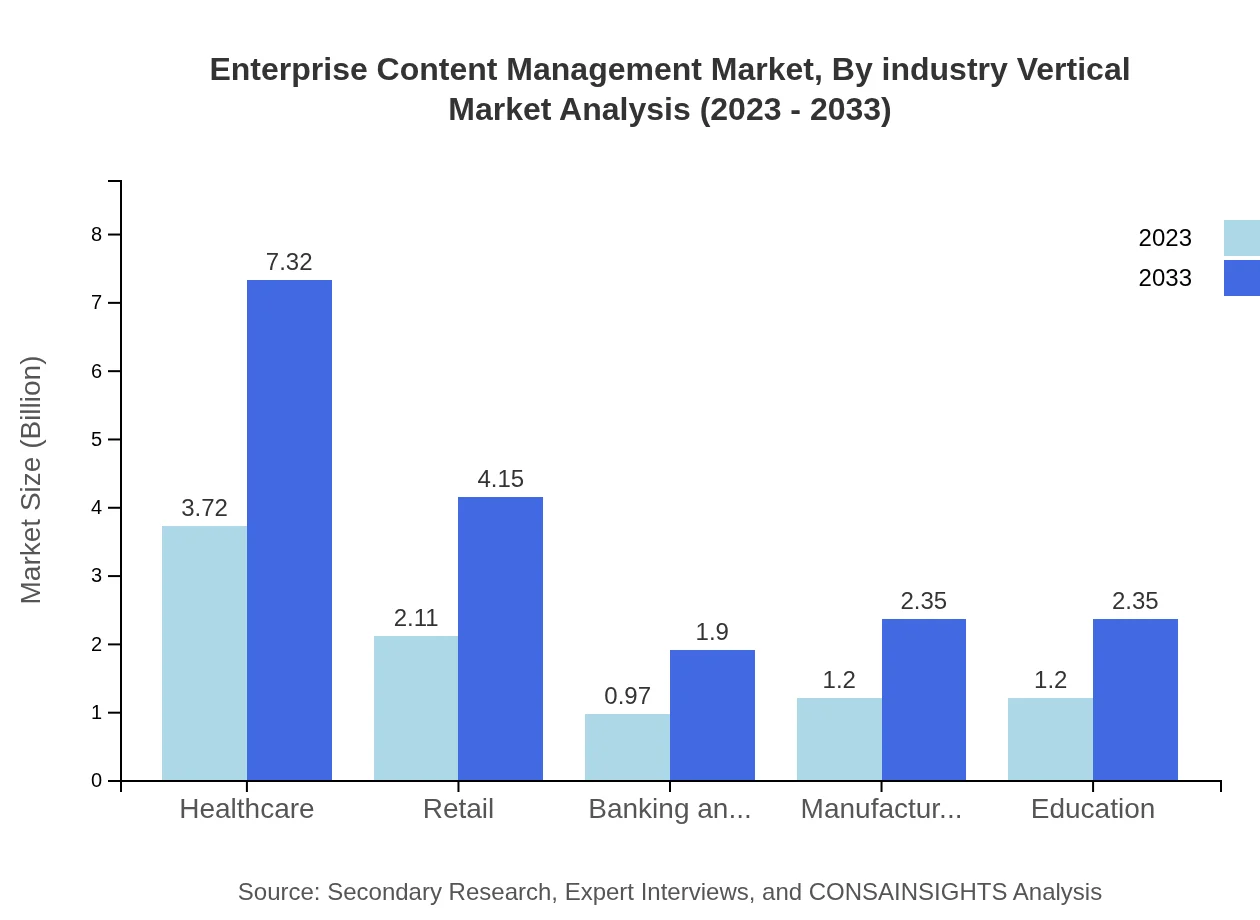Enterprise Content Management Market Report
Published Date: 31 January 2026 | Report Code: enterprise-content-management
Enterprise Content Management Market Size, Share, Industry Trends and Forecast to 2033
This report provides a comprehensive analysis of the Enterprise Content Management (ECM) market from 2023 to 2033, offering insights on market size, trends, segments, and regional performances, along with forecasts and competitive landscape assessments.
| Metric | Value |
|---|---|
| Study Period | 2023 - 2033 |
| 2023 Market Size | $9.20 Billion |
| CAGR (2023-2033) | 6.8% |
| 2033 Market Size | $18.08 Billion |
| Top Companies | Microsoft Corporation, OpenText Corporation, IBM Corporation, Hyland Software |
| Last Modified Date | 31 January 2026 |
Enterprise Content Management Market Overview
Customize Enterprise Content Management Market Report market research report
- ✔ Get in-depth analysis of Enterprise Content Management market size, growth, and forecasts.
- ✔ Understand Enterprise Content Management's regional dynamics and industry-specific trends.
- ✔ Identify potential applications, end-user demand, and growth segments in Enterprise Content Management
What is the Market Size & CAGR of Enterprise Content Management market in 2023?
Enterprise Content Management Industry Analysis
Enterprise Content Management Market Segmentation and Scope
Tell us your focus area and get a customized research report.
Enterprise Content Management Market Analysis Report by Region
Europe Enterprise Content Management Market Report:
Europe's ECM market shows substantial growth potential, anticipated to increase from USD 2.74 billion in 2023 to USD 5.38 billion by 2033. The push towards compliance and data protection regulations heavily influences this growth.Asia Pacific Enterprise Content Management Market Report:
In the Asia Pacific region, the ECM market is valued at USD 1.57 billion in 2023 and is expected to reach USD 3.09 billion by 2033, driven by increasing internet penetration and digital adoption among businesses. The region's diverse industries, including healthcare, retail, and finance, drive the need for efficient content management solutions.North America Enterprise Content Management Market Report:
The North American ECM market dominates, expected to grow from USD 3.53 billion in 2023 to USD 6.94 billion by 2033. This region's strong regulatory landscape, high adoption of digital solutions, and presence of key market players bolster its market position.South America Enterprise Content Management Market Report:
South America's ECM market reflects a growth trajectory, starting with USD 0.25 billion in 2023 and reaching USD 0.50 billion by 2033. Factors contributing to this growth include a burgeoning startup ecosystem and rising investments in technology infrastructure.Middle East & Africa Enterprise Content Management Market Report:
In the Middle East and Africa, ECM market figures are projected to rise from USD 1.10 billion in 2023 to USD 2.17 billion by 2033. Growing awareness of digital transformation benefits and increased investments in technology drive this growth.Tell us your focus area and get a customized research report.
Enterprise Content Management Market Analysis By Content Type
The ECM market by content type shows strong performance for documents, which dominate the market at USD 6.03 billion in 2023, projected to reach USD 11.85 billion by 2033. Images and videos follow, valued at USD 1.97 billion and USD 1.21 billion in 2023, respectively, indicating significant growth as well. Each content type's application varies across industries, showcasing the necessity of adaptable solutions.
Enterprise Content Management Market Analysis By Deployment Model
By deployment model, on-premises systems hold a significant market share of USD 6.03 billion in 2023, maintaining a presence due to existing legacy systems. Cloud-based solutions are gaining traction, growing from USD 1.97 billion to USD 3.86 billion, reflecting a shift toward flexibility and scalability.
Enterprise Content Management Market Analysis By Business Function
The market segmentation by business function highlights that human resources automation leads at USD 4.72 billion in 2023, with significant shares held by marketing and finance functions as businesses prioritize efficiency in their operations.
Enterprise Content Management Market Analysis By User Type
In terms of user type, small and medium businesses (SMBs) represent the largest segment, valued at USD 6.03 billion in 2023. This reflects an ongoing trend where SMBs increasingly recognize the need for effective content management to enhance productivity.
Enterprise Content Management Market Analysis By Industry Vertical
The ECM market across various industries shows diverse adoption rates, with healthcare showing a strong inclination towards ECM solutions to address high data sensitivity and regulatory compliance. Other growing sectors include education and manufacturing, indicating a broad market applicability.
Enterprise Content Management Market Trends and Future Forecast
Tell us your focus area and get a customized research report.
Global Market Leaders and Top Companies in Enterprise Content Management Industry
Microsoft Corporation:
A leader in digital content management solutions, Microsoft offers SharePoint, providing corporate collaboration through document management and workflow automation.OpenText Corporation:
Specializing in enterprise information management, OpenText provides ECM solutions that help organizations manage digital assets effectively and securely.IBM Corporation:
With its Watson AI capabilities, IBM offers innovative content management solutions that leverage advanced analytics and machine learning.Hyland Software:
Focused on enterprise content management, Hyland delivers OnBase solutions which streamline workflows and enhance organizational efficiency.We're grateful to work with incredible clients.









FAQs
What is the market size of enterprise Content Management?
The global Enterprise Content Management market is valued at approximately $9.2 billion in 2023, with a projected compound annual growth rate (CAGR) of 6.8% through 2033.
What are the key market players or companies in this enterprise Content Management industry?
Key players in the Enterprise Content Management sector include IBM, Microsoft, OpenText, Box, and Alfresco, which dominate the market with innovative solutions and extensive customer bases.
What are the primary factors driving the growth in the enterprise Content Management industry?
Factors driving growth include increasing data generation, the need for compliance and regulation, operational efficiency demands, and advances in cloud technology which enhance access and collaboration.
Which region is the fastest Growing in the enterprise Content Management?
The North American region is the fastest-growing, projected to increase from $3.53 billion in 2023 to $6.94 billion by 2033, significantly influenced by technological adoption and business needs.
Does ConsaInsights provide customized market report data for the enterprise Content Management industry?
Yes, ConsaInsights offers customized market report data tailored to specific interests and needs within the Enterprise Content Management industry, ensuring targeted insights for decision-making.
What deliverables can I expect from this enterprise Content Management market research project?
Deliverables include comprehensive market analysis reports, growth forecasts, competitive landscape assessments, and segmented data insights to guide strategic planning for stakeholders.
What are the market trends of enterprise Content Management?
Key trends include a shift toward cloud solutions, enhanced integration capabilities, focus on AI and automation, and increasing importance of data security in content management strategies.

